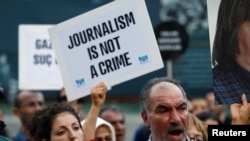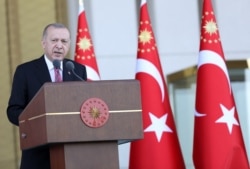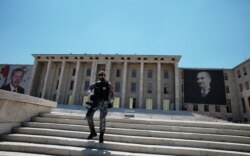In its pursuit of those behind a deadly failed coup in 2016, Turkey has been accused by rights groups of unfairly persecuting critics and members of the media.
More than 250 people were killed and about 2,000 were injured during a failed power grab that Turkey says was orchestrated by the Gulen movement, a group led by Fethullah Gulen. The cleric, who lives in self-imposed exile in the U.S., denies involvement.
As Turkey sought to restore order and find those involved, though, hundreds of journalists and other critics also were detained or accused of being part of the failed coup.
In the past five years — two of which were under a state of emergency — hundreds of lawsuits were filed, multiple media outlets were forced to close, and thousands of public officials were dismissed for alleged links to the Gulen movement or Fetullah Terrorist Organization (FETO).
The country has been labeled a leading jailer of journalists and fell in media freedom rankings. The U.S. based Freedom House has said of Turkey: “The authoritarian nature of the government was fully consolidated after the 2016 coup attempt, which triggered a heavy crackdown on those deemed to oppose the leadership.”
Ankara has even tried to reach nationals living outside its borders.
Freedom House identifies Turkey as one of several countries that uses transnational repression — the detention, harassment or retaliation of nationals and their families — to reach critics outside its borders.
The rights group says Ankara ramped up retaliation after the attempted coup, and that “Ankara initiated a 'global purge' that mirrored its domestic crackdown.”
A spokesperson for the Turkish Embassy told VOA via email that the allegations and criticisms are “based on biased information that do not merit any serious consideration.”
“We expect a basic understanding of the suffering Turkey as a nation faced five years ago on this day when members of the Fetullah Terrorist Organization attempted to overthrow the democratically elected government in Turkey, bombed the Turkish Grand National Assembly and fired on the civilians,” the statement, emailed Thursday, said. “We believe that the friendship between democratic nations requires solidarity against such attacks, targeting the very fundamental principle of democracy.”
Ankara has dismissed criticism. At a party meeting on July 8, President Recep Tayyip Erdogan described the failed coup as “one of the most treacherous attempts in our history.”
He has said previously that journalists are prosecuted for terrorism offenses, not their journalism. His Foreign Minister Mevlut Cavusoglu was cited as saying one year after the coup, “There is currently not even one journalist who is in custody in Turkey for writing news stories.”
On the fifth anniversary of the coup, Nate Schenkkan, director of research strategy at Freedom House, says conditions for media deteriorated rapidly and remain delicate today.
The following are excerpts from VOA Turkish Service’s interview with Schenkkan. The questions and answers have been edited for length and clarity.
Q: Turkey has gained a reputation for being one of the world's leading jailers of journalists. Media and press freedom advocates say the arrests are often retaliatory and in response to critical reporting. What is your view of the situation for Turkish media?
A: The situation since the coup attempt has gotten far worse. It was already quite poor to begin with, but it definitely deteriorated after 2016. First, there was a series of summary closures of media outlets, and it's important to note this included Gulen-movement-affiliated outlets that were closed and seized by the government, but also other outlets that were mostly affiliated with Kurdish or left-wing causes. There was also the continued transfer of ownership that took place in the media sector, and the severe consolidation that's taken place with pro-government media holding companies taking the dominant position over the private sector.
The situation right now is quite delicate in terms of the economic situation in Turkey being poorer than it has been really in the entire period of the AKP and Erdogan’s rule. The COVID situation continues to weigh on the economy and on people's minds. And I think there's also a great deal of frustration in the population at large with restrictions on media, on what you can say online, whether you can protest or demonstrate and the sense that the government really punishes speech very aggressively, including quite innocent speech.
Q: How has this affected Turkey’s press? Do you think there are questions journalists are too intimidated to ask?
A: I don't want to say that Turkish press have failed, because they operate under enormous pressure and because also there have been journalists who have attempted and have tried to examine the claims of the government. At the same time, it is certainly true that the conduct of the trials and the conduct of the post-coup period has made it very difficult for any observers, much less Turkish journalists, to comprehensively cover them.
We have even now hundreds of trials taking place all over Turkey involving hundreds of thousands of people. And there's simply no way, there's no central repository for that information. And there's no way, especially in this environment, for people to really sift through and find the truth.
As someone who's read a number of the key coup indictments and charges … there are enormous gaps in terms of the story that's told and the way that the government presents it. Five years later, we're still quite a long way from knowing exactly what happened and why things happened the way that they did.
Q: After July 15, 2016, thousands of coup-linked detentions and attempted extraditions have occurred. Freedom House reports that the Turkish government has forcibly returned 100 citizens from at least 20 countries since 2016. Is the situation getting worse?
A: This process of transnational repression, by which the Turkish government pursues exiles abroad, is something that escalated dramatically since the coup attempt. This is not a practice that the Turkish government had used regularly prior to 2016, and after 2016 it's really embarked on a very comprehensive, very steady, methodical plan of returning people illegally from abroad.
This is about [Turkish authorities] returning at least 100 — considerably more now, probably, if you include family members. They do not take place through court rulings, they do not take place within normal judicial procedures. And as such they are illegal. And it is a disturbing turn when you see techniques of the Turkish state that existed and predated the AKP government, but were applied largely within Turkish borders, now starting to be applied abroad.
This story originated in VOA’s Turkish Service.












